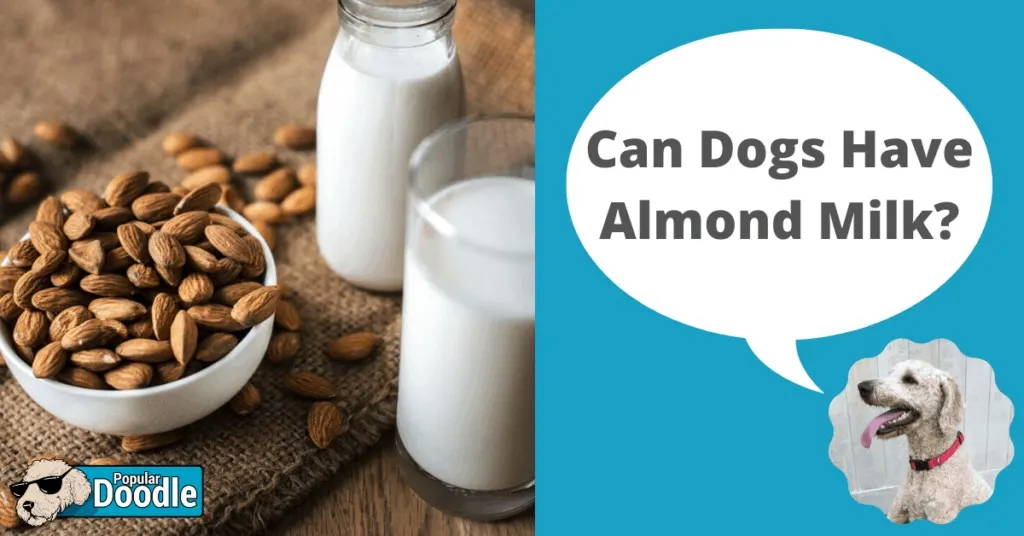
From grocery stores to coffee shops, almond milk is becoming increasingly popular as a dairy milk substitute! As you may know, most dogs are lactose intolerant to one degree or another. Since lactose intolerant humans often use a nut milk to satisfy their milk cravings, can dogs have almond milk? So, is almond milk okay for dogs? Let’s answer this question and more!
Can Dogs Have Almond Milk? (The Short Answer)
Yes, dogs can have almond milk! Before you give it to your pup, there are a few important things to consider. First, only feed your dog plain, unsweetened almond milk. Other varieties can contain added sugar and/or artificial ingredients that aren’t good for your dog. Also check the ingredient list for “xylitol.” Xylitol is often used as an artificial sweetener and it is deadly to dogs. Almond milk can even be considered healthy because it’s low-calorie, contains little sugar, has an abundance of nutrients, and offers a lactose-free milk option for dogs. Of course, only give almond milk in small amounts to avoid overwhelming your dog’s gastrointestinal system!
It’s important to remember, that even with the best of intentions, accidents happen and dogs can easily eat things they shouldn’t. Unfortunately, even if those accidents aren’t fatal, they can result in huge, unexpected veterinary expenses. That’s why we recommend all responsible dog owners get a free, online pet insurance quote from Healthy Paws.
Is Almond Milk Good For Dogs?
We’ve already answered the question, “is almond milk okay for dogs?” Now, let’s learn about the benefits of feeding your dog this food! Is almond milk good for dogs?
Water can be boring after a while and you may want to let your pup indulge in a new drink. Knowing that many pups are lactose intolerant, you may consider the lactose-free option of almond milk. But, is almond milk okay for dogs?
Yes, almond milk is good for our four-legged friends depending on the specific variety. A lot of people assume almond milk is a healthy dairy substitute, but that is not always the case. Plain, unsweetened almond milk is the best option to share with your pup. Other varieties, such as sweetened or flavored almond milk, often contain added sugars and additives including xylitol, a lethal ingredient to pets.
On average, unsweetened almond milk has a serving size of about one cup. One serving consists of 30 calories, 2.5 grams of fat, 1 gram of carbohydrates, and 0 grams of sugar. However, even a single cup is way too big of a portion to give your pup!
There are a lot of health benefits associated with almond milk. Here are some:
- Low in sugar
- Low in calories
- High in important vitamins and minerals
- Lactose-free
- Good for heart health
Let’s elaborate on some of the benefits! As previously mentioned, there are a small amount of calories and sugar. When looking for new treats to share with your pet, this is an important factor. Dogs don’t need as many calories as we humans do. In fact, they only require around 20-30 calories per pound of body weight. Large dogs tend to steer more towards the lower end, and smaller dogs more towards the higher end. For example, a 15 pound dog would require around 450 calories a day and a 65 pound dog would require around 1,300 calories per day. Remember these are just examples, and not specific to your pet, as specific requirements vary. Your veterinarian will be able to help you determine a more specific number. However, the point is to show how much more calories impact dogs than humans. Dogs weigh less and need fewer calories—so while a 100 calorie snack isn’t a huge deal for humans, that could be considered a big portion of your dog’s intake for the day!
Along with relatively few calories in almond milk, it also has low sugar content. In unsweetened varieties there are generally 0 grams of sugar which is ideal! Too much sugar in your dog’s diet can cause obesity and potentially diabetes.
Another plus of almond milk is that it is a lactose-free item. Dogs only require milk as young puppies, and most become lactose intolerant as they age. Therefore, cow’s milk usually isn’t a safe option for dogs—but almond milk is!
Additionally, there are a ton of vitamins and minerals in almond milk, some of which help promote heart health! Almond milk has high levels of vitamins E, A, and D! These are all beneficial for your pup. Vitamin E is important because it is an antioxidant that helps destroy dangerous free radicals. Vitamin A is required for proper functioning of the skin, coat, muscles, and nerves. Finally, vitamin D is important in helping balance and retain levels of calcium and phosphorus. Along with these important vitamins, there are ample amounts of iron, potassium, and calcium in almond milk. Iron is important in the transport of oxygen in hemoglobin. Potassium helps control nerve impulses, brain function, muscle activity, and heart function. Finally, calcium is essential for keeping bones strong and healthy. With low cholesterol, sodium, and saturated fats, combined with healthy fats and adequate amounts of potassium—almond milk is great for your dog’s heart health!
Is Almond Milk Bad for Dogs?
We’ve already answered the question, “can dogs have almond milk?” Now, let’s learn about the dangers of feeding your dog this food! Is almond milk bad for dogs?
The wrong kind of almond milk can be bad for dogs. Unsweetened, plain almond milk is generally safe for dogs. However, sweetened or flavored almond milks are not safe. Additionally, too much is never a good thing. Almond milk should NEVER be a substitute for your dog’s daily water intake.
There are so many type of almond milk: unsweetened plain, vanilla, unsweetened vanilla, chocolate, organic, and even almond coconut milk! How to you weed out all the potentially dangerous options? For starters, chocolate is not okay for dogs and chocolate almond milk is no different. Additionally, you should always look for “xylitol” in the list of ingredients and avoiding giving any milk that contains it. This is a common sweetener used in human foods, but is toxic in dogs. It’s more likely that vanilla or sweetened varieties of almond milk would contain this ingredient. These types also would most likely contain more sugar which is another negative. That is why it’s recommended that only plain, unsweetened almond milk be given to your dog.
As a general rule of thumb, we should only be giving our dogs small quantities of human food to avoid any negative side-effects. For starters, almonds aren’t always easily digestible for dogs. This means that the milk may not settle well and too much can cause bloating, gas, diarrhea, or even vomiting. While the serving size is one cup, that is way too much for a dog! Go with just a few licks for them to get a taste.
Other Varieties & Related Foods:
Can Puppies Drink Almond Milk?
Technically, yes, puppies can drink almond milk but it’s recommended that you avoid it until they’re older. First, almond milk isn’t a replacement for their mother’s milk. Puppy-specific dog foods are preferred because they include all the nutrients your pup needs! If your puppy accidentally drinks a small amount, they should be fine.
Can Dogs Have Unsweetened Almond Milk?
Yes, in fact, unsweetened almond milk is the safest kind of almond milk to give to your pup. Without any fear of dangerous additives or additional sugar that they don’t need, it’s considered the safest and healthiest. It is also least likely to contain xylitol.
Can Dogs Have Almond Milk Yogurt?
Yes, dogs can have almond milk yogurt! This offers a lactose-free yogurt option for your pup. Remember to go with plain variety and not vanilla, as vanilla is likely to contain additives, excess sugar, and potentially xylitol.
Can Dogs Have Vanilla Almond Milk?
Dogs shouldn’t have vanilla almond milk. Vanilla almond milk often has additional sugars and additives that aren’t ideal for dogs. It’s best to stick with plain, unsweetened almond milk.
Is Goats Milk Safe for Your Pup?
It depends! Unpasteurized goat milk contains a lot of important essential vitamins, minerals, fatty acids, and enzymes. It’s also great for a dog’s digestive tract. The one big problem with this is that pasteurization ensures there is no harmful bacteria in the milk. Pasteurization also gets rid of a lot of the benefits of goat milk as well. However, it does get rid of the lactase enzyme in the milk which is what makes it easier for dogs to digest. That means that pasteurization turns the goat milk into a lactose-containing product which is not safe for lactose intolerant dogs. To minimize the risk of any harmful bacteria you must ensure the milk is coming from a healthy animal, in a clean facility. This can be hard to verify. Organically-grown goat milk is usually the best bet, however if you have any doubts whatsoever, you should not give your dog goat milk. Remember, dogs are already getting all the nutrients they need, so missing out on goat’s milk will not be detrimental to their overall health.
In Conclusion: Can Dogs Drink Almond Milk?
So, is almond milk okay for dogs? Yes! Plain, unsweetened almond milk is safe for your dogs to drink in small quantities. It’s a low-calorie, low-sugar snack that is rich in vitamins and minerals. Important things to remember include to keep it plain and check the ingredients for the potentially lethal sweetener, xylitol.
Want to Learn More?
Check out these related articles from our “Read Before You Feed” series for more advice on safe foods for dogs!
Disclaimer: We are not veterinarians and this article should not be taken as medical or veterinary advice. If you have any questions about your pet’s health or dietary needs, please contact your local veterinarian.








